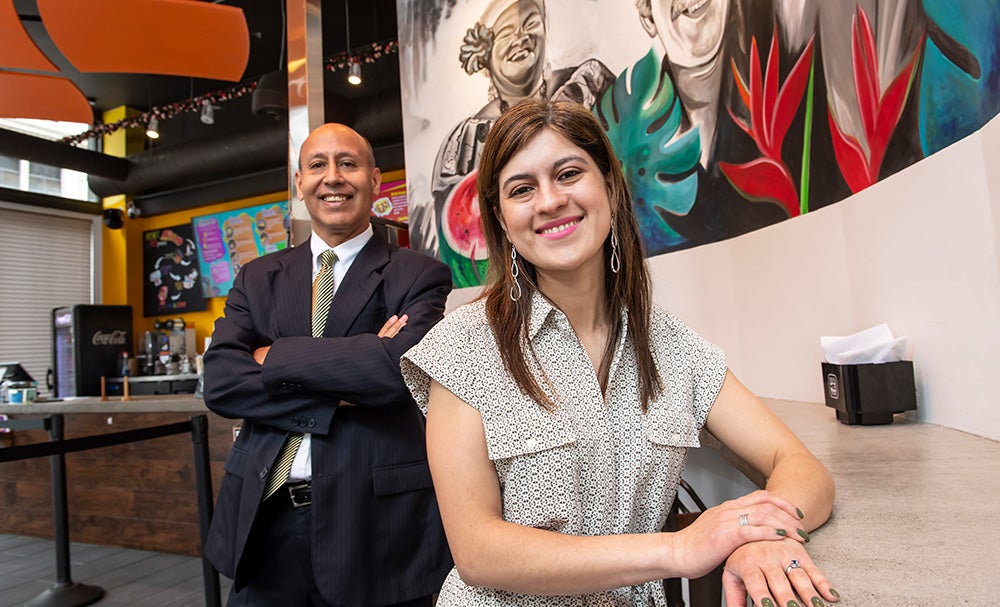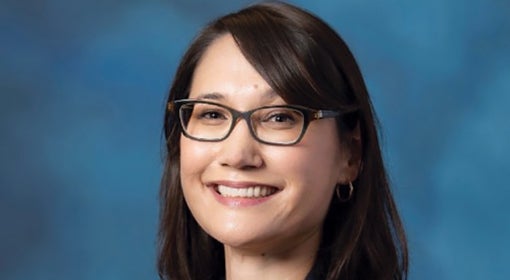The young man takes a deep breath as he pulls open the building’s front door. A receptionist shows him into a conference room. Robert Stein, just 24 years old, feels edgy. Within minutes, in walk both the CEO and CFO of Butler Gas Products Company, a Pittsburgh-area multi-generational family business with more than 50 employees and seven figures in annual revenue. If Stein didn’t feel intimidated before, he certainly does now.
Stein is here to advise these executives on a key part of their business, but he wants to be up front with them. “I’m not a consultant,” he quickly admits.
He’s at this 2005 meeting because of Ann Dugan, founder of the University of Pittsburgh’s Institute for Entrepreneurial Excellence (IEE). Despite its lofty name, IEE has had a very down-to-earth mission since its 1993 inception: serving Western Pennsylvania’s small and closely held businesses — like Butler Gas Products — to boost the region’s economic development.
Through its centers, IEE, part of Pitt’s Office of Innovation and Entrepreneurship, offers free consulting services, education and networking opportunities to area businesses at all stages. The resources help them increase profitability and add or save jobs. The largest of IEE’s five centers is its Small Business Development Center (SBDC), which holds workshops with regional businesses and provides no-cost consulting.
In 2004, Stein wasn’t a trained consultant. He was an entrepreneur pursuing a master’s degree in business administration (MBA) at the Joseph M. Katz Graduate School of Business. But Dugan believed in Stein and knew that he had the necessary “technology expertise” to help the gas products company.
She was right. Stein overcame his jitters and helped Butler Gas Products implement a complex new information technology system. Word spread of his success. Dugan recalls getting call after call inquiring about the availability of IEE’s newest SBDC consultant.
“Having someone like Bob was a real jewel,” she says.
Stein, meanwhile, loved the work — which surprised him. He was used to running his own show. Years earlier, as a teenager, he had begun a career with Microsoft and launched a highly successful website.
“But I found that I really enjoyed working with small-business owners, enabling them to make better business decisions that, for many of them, make the difference of several hundred thousand dollars to their bottom line,” says Stein.
After earning an MBA and while his website remained active, Stein had a new career path at IEE, where he quickly climbed the ranks. In 2014, before Dugan retired, Stein was named executive director of the IEE.
Under his leadership, it has continued to thrive. In 2021 alone, the IEE served nearly 1,800 business owners, completed nearly 15,000 consulting hours, facilitated 73 new business launches, assisted with $22.5 million in new capital raised and supported nearly 10,000 area jobs.
In 2020, the U.S. Small Business Administration recognized IEE’s SBDC as the number one of its kind in the country and named it the winner of the SBDC Excellence and Innovation Award.
All this, with a roster of just 15 dedicated employees, including directors, consultants and staff.
Despite the success stories, Stein knows the IEE can’t rest on its laurels. His own background in business has taught him the value of leveraging today’s win for tomorrow’s challenge. There are many businesses, he says, whose success or failure can hinge on the institute’s guidance.
 It’s 2:30 in the afternoon on a summer day in 2019 in Pittsburgh’s South Side neighborhood. At The Colombian Spot, a popular restaurant, the usual Sunday crowd is in full swing. Animated conversation fills the air, punctuated by the buoyant strains of Latin American pop music. Stringed lights hang from the ceiling while a large-screen, ready-for-soccer TV is mounted on one wall. Colorful murals depict the history of arepas — fried, stuffed cornmeal cakes popular in Colombia. A group at the bar breaks out in peals of laughter while a family digs into their meal nearby.
It’s 2:30 in the afternoon on a summer day in 2019 in Pittsburgh’s South Side neighborhood. At The Colombian Spot, a popular restaurant, the usual Sunday crowd is in full swing. Animated conversation fills the air, punctuated by the buoyant strains of Latin American pop music. Stringed lights hang from the ceiling while a large-screen, ready-for-soccer TV is mounted on one wall. Colorful murals depict the history of arepas — fried, stuffed cornmeal cakes popular in Colombia. A group at the bar breaks out in peals of laughter while a family digs into their meal nearby.
Brent Rondon sits at a small table in the back. He’s a SBDC consultant with decades of experience. Across from him is Karen Perdomo, the brown-haired bundle of energy who, with her husband, John Oritz, owns and runs the eatery.
Perdomo seems to hang on Rondon’s every word — and for good reason. He’s been instrumental in helping Perdomo and Ortiz make this restaurant a reality. Today, they are discussing suppliers, but it could just as easily be anything from legal and leasing advice to construction and staffing issues.
Perdomo and Ortiz originally came to Pittsburgh in 2014 for his oil and gas industry job. The couple, finding little in the way of traditional Latin American food in the area, saw an opportunity. They decided to open a restaurant themselves, with Perdomo leading the charge. Although Ortiz may have been, as his wife says, “a great cook,” neither had a bit of experience in the food industry. Undaunted, Perdomo dove in.
She had heard through the community about Rondon and the small business seminars he conducts in Spanish, her native language. After attending one, she pulled Rondon aside to ask for his advice. It was the beginning of a very productive partnership.
As Perdomo’s consultant, Rondon first emphasized the importance of building an informed and feasible business plan.
“I pulled resources who spoke Spanish, including lawyers, accountants, bankers and insurance companies, to explain to her from their points of view how the restaurant industry works,” Rondon says. “Information from different professions is key for setting expectations. You have to know that from the get-go.”
Only after countless hours of listening, researching, testing a food stand, leasing, constructing and training a chef to prepare Ortiz’s authentic recipes, did the doors to The Colombian Spot open. It quickly became a go-to for Latin American food lovers and the Pittsburgh Latino community.
Then came the pandemic.
Yet, with her dedicated clientele and Rondon’s information on U.S. Small Business Administration programs, grants and other coping strategies, Perdomo managed to weather the worst of the crisis. She not only kept her business afloat — she expanded it. In 2021, with help from Rondon, Perdomo opened a second restaurant, this one near Pitt’s campus. The neighborhood-friendly spot does speedy take-out and offers veggie and gluten-free options. It’s now busy, too.
Stein is proud of the guidance and encouragement Rondon has given Perdomo and her husband. He also admires the couple’s undaunted entrepreneurial spirit, even when confronted with left field challenges.
Watching business owners achieve success with support from consultants is one of Stein’s favorite parts about being IEE’s executive director. He knows well how much work it takes to build and run a business — he’s been studying the art form for most of his life.
Stein grew up 25 miles outside of Pittsburgh, where his father managed the family’s coal processing company. He was one of four siblings but the only one interested enough to tag along as his dad worked. Eventually, he was invited along on the occasional international business trip to places like India and Turkey, where he had a literal seat at the table.
“Seeing my father in action gave me that entrepreneurial spark,” says Stein.
He also discovered a penchant for computers; and, as a young teen in the early 1990s, he was curious about learning to fly. He got hooked on an acclaimed game, Microsoft Flight Simulator, which allowed players to virtually pilot a plane around the world. AOL had a gaming forum where users could talk to each other through message boards and share tips and tricks. Stein quickly became an active participant. It took less than a year before AOL tapped him to volunteer as a forum manager to help monitor discussions and create content. According to Stein, the company had no idea it had engaged a middle-schooler.
These were the days of dial-up internet. Stein recalls looking up one evening to see his parents staring at him with troubled expressions. They called him over for a talk. Their son had run up an $800 phone bill.
Stein pleaded his case, explaining how fascinated he was with computer programing and the internet. He stressed that he “was on to something.” Amazingly, “Instead of cutting it off, they found a way to make it work and encouraged it.”
They knew their boy. Microsoft came calling next. The software company had launched Microsoft Network (MSN), an online community, in competition with AOL. MSN recruited Stein to run its gaming forums, and the 14-year-old happily agreed.
Seeing a market opportunity, he asked his father to help him form a company. By the next year, at the age of 16, he had launched ActiveWin.com, a website dedicated to discussions about Microsoft products, with reviews, message boards and more. The site took off.
“I was an influencer before there were influencers,” he says.
Stein laughs at the memory of attending a Microsoft conference in Los Angeles for an early preview the XBox gaming console. He had been invited as a guest and skipped his prom to attend. He says the Microsoft employees were visibly startled when they realized that the techie they knew only from the internet was just 18 years old.
“What were they going to do?” shrugs Stein. “My website was big enough at that point that it didn’t really matter. So, they just ran with it.”
“Big enough” meant that the site received several million page views a month and 900,000 unique views. He would eventually come to earn 14 Microsoft Most Valuable Professional awards, which the company gives to top technology experts.
When Pitt’s Ann Dugan met him, Stein was formalizing his business education at Katz, interested in employment opportunities and still knee-deep in ActiveWin, which had an informative, consultative approach. So, when Stein showed up for that meeting at Butler Gas, Dugan knew he was already a consultant; he just didn’t realize it.
Sharing his knowledge and helping other businesses grow were more satisfying than he had expected. It was a culmination of his interests and his experiences. He was hooked.
Today, as IEE’s executive director and Pitt’s associate vice chancellor for innovation and entrepreneurship, Stein guides the IEE’s strategy and fundraising to accomplish its larger mission. Along with the SBDC, IEE centers include a membership program that, for an annual fee, offers education, networking, consulting and more; PantherlabWorks, which helps companies bring new products and services to market; the Urban and Community Entrepreneurship Program, which supports small businesses in marginalized and underserved neighborhoods; and the Entrepreneurial Fellows Class certificate program.
Stein is quick to emphasize that it’s truly a group effort: “It’s the whole team really making a difference.”
Along with his responsibilities, he makes time for some consulting and stays in touch with his early clients. He says those business owners — and all the entrepreneurs like them — keep him motivated.
 It’s late fall 2019, and Jill Smallwood is driving to work at the crack of dawn, like she does most days. Her ride: a huge Mack truck. It's a shiny new teal number capable of hauling 20 tons and proudly emblazoned with the name of her company, J KoKo Hauling, on the driver’s door. J stands for Jill and Koko for Kokomo, Indiana, where the Pittsburgher was born and raised.
It’s late fall 2019, and Jill Smallwood is driving to work at the crack of dawn, like she does most days. Her ride: a huge Mack truck. It's a shiny new teal number capable of hauling 20 tons and proudly emblazoned with the name of her company, J KoKo Hauling, on the driver’s door. J stands for Jill and Koko for Kokomo, Indiana, where the Pittsburgher was born and raised.
Smallwood is headed to a job helping with a water-line replacement. She arrives on site before rush hour traffic and is directed toward her pickup spot. As she expertly backs the massive vehicle into position on the paved roadway, she lets out a sigh of relief that today’s jobsite is nothing like the last one. There, she had to pilot in reverse along a narrow dirt path, with a drop-off on the right side so steep and harrowing that one wrong move could have meant disaster. “It would’ve killed us both — the truck and me!” she says.
Today, the job is thankfully less dramatic.
“Is that your truck?” a crew member yells out over the engine’s rumble.
“Yes, it is,” Smallwood replies, smiling, for what feels like the thousandth time since she launched her business that June. Not many expect a woman to be behind the wheel of a truck like this, let alone the owner of a hauling company.
“She’s a beauty!” he shouts back.
It's been tough getting to this point, but Smallwood has always followed her own path. She served nine years in the U.S. Army Reserve and 24 years as a detective with the Pittsburgh Bureau of Police, all while maintaining rental properties around the city. When she retired from policing, she was intrigued by the idea of starting her own business — something that would allow her to be her own boss — but she wasn’t exactly sure which direction to go. Then, she bumped into a work associate, who mentioned the trucking business. A spark was ignited.
Smallwood began to research the idea and connect with others in the industry. She joined an entrepreneurial group, where members suggested she check out Pitt’s IEE for more help.
She soon met with SBDC consultant Meghan Hillegas, whom she now calls “my little angel.” Hillegas helped Smallwood refine her business plan, construct a breakeven analysis and run financial projections. As a bonus, Hillegas herself had experience in the construction industry. The two discussed everything from equipment to staffing decisions.
“She made such a difference,” Smallwood says. “I couldn’t have done it on my own.”
“Jill’s phenomenal,” says Hillegas. “That’s the thing about this job. You get close. You really care.”
Smallwood sold a rental property for the truck’s down payment but was too nervous at first to drive the monster home from Scranton, Pennsylvania. She prayed, gritted her teeth and practiced until she could maneuver with ease. With a steady hand on the wheel and Hillegas’s assistance, she built a business transporting everything from scrap metal and stone to dirt and construction waste. She was soon able to add a smaller truck, hire a full-time driver and contract drivers for specific jobs—allowing her to focus on running the business.
“I’m a Black female, and I didn’t come from a trucking family,” she says, “so that meant I had to prove myself all the way around.”
Although she’s gratified by her own accomplishments, there’s something else that drives her. “I’m most proud to be able to employ people, to create jobs for the community,” she says.
Smallwood’s entrepreneurial story is one that plays out again and again in Western Pennsylvania. Through the IEE, business owners who need information, connections and support to flourish find all three. With a lot of work, they often prosper.
“It takes a village to raise an entrepreneur,” says Smallwood. And a big part of that village, she adds, is the IEE.
“As an anchor institution for the region, the University of Pittsburgh takes seriously our responsibility to share the knowledge we create on our campuses with the communities we call home," says Evan Facher, vice chancellor for innovation and entrepreneurship and director of Pitt's Innovation Institute. "Helping businesses and entrepreneurs thrive is critical to this work, and the Institute for Entrepreneurial Excellence has proven itself as a fantastic asset fueling economic growth throughout the commonwealth.”
Assisting with these kinds of impacts, says Stein, is what makes the work so rewarding. It’s a departure from the website building and software analyses of his earlier career, but he wouldn’t have it any other way.
“You get to make a difference,” he says. “By changing peoples’ companies and helping them start companies, you’re changing their lives and you’re benefiting the community around these businesses. They’re so appreciative. You see them implement your recommendations. You see the changes being made, and the same thing happens over and over.
“You go to sleep every night feeling very fulfilled.”
Cover image: Bob Stein stands on Forbes Avenue in Pittsburgh's Oakland neighborhood.
This story was posted on May 23, 2022. It is from Pitt Magazine’s Spring 2022 issue.





